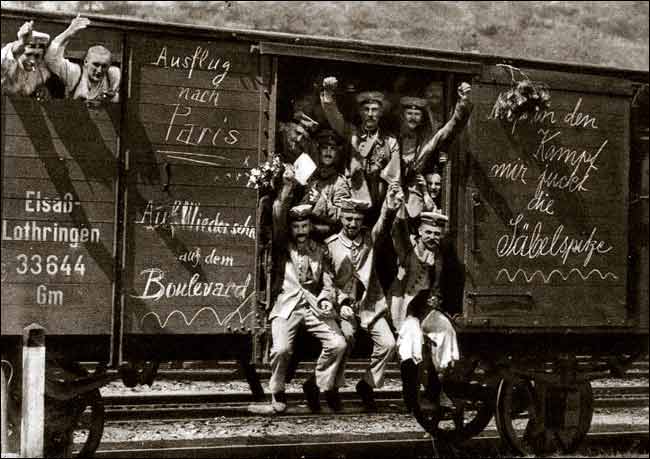The Great Upheaval: Reading Barth’s Early War Sermons
 |
| German Soldiers headed to the front (likely 1914) (Public Domain, via Wikimedia Commons) |
A Unique Time of God: Karl Barth’s WWI Sermons, Trans. & Ed. By William Klempa (Louisville, KY: Westminster John Knox, 2016).
In many later writings, Barth would credit disillusionment with the war as the prime catalyst for the emergence of early dialectical theology, crystallized especially in the second edition of his Romans commentary. This historical backdrop, fraught and fascinating, imbues with special poignancy and interest this collection of 13 sermons Barth delivered in his Safenwil parish (and its environs) from the the time that Austria-Hungary declared war upon Serbia in late July 1914 to early November that year, as the war had grown to engulf Germany, France, Great Britain, Russia, and the Ottoman Empire.
These homilies, translated from the German originals in the Predigten 1914 volume of the Karl Barth Gesamtausgabe, are available here for the first time in English. As Anglophone students of Barth are well aware, translations of Barth's earliest material remain sparse: A 1911 speech on socialism, for example, and a sermon on the sinking of the Titanic, as far as I know, are pretty much the extent of it, until the story picks up with the Barth-Thurneyson correspondence (excerpted in Revolutionary Theology in the Making), the short 1915 essay on Christophe Blumhardt, and the opening essays in The Word of God and Theology. Thus, this volume promises to enrich private study, seminary classrooms, and (dare I hope for it?) the theo-blogosphere.
According to Klempa, these sermons reveal not only Barth's political acumen and staunch opposition to the war, but they also offer crucial insights into his early theological development. Klempa writes:
[I]t is clear that in Barth's early preaching, and in these war sermons in particular, are the true beginnings of Barth's later theology. The doctrines that are discussed more fully in the Church Dogmatics -- God, Jesus Christ, the Holy Spirit, creation, providence, sin, judgment, the supremacy of God's grace over sin, the "new world of the Bible," and eschatology -- are to be found in nunce
in these war sermons (xii).
To be sure, such a sweeping assessment can't go untested. As experts in Barth's early work have shown, the relationship between incipient and more fully-ripened iterations of these doctrinal loci is exquisitely, perhaps even maddeningly complex. How earlier and later strands are interwoven is far from self evident. That's all the more reason, though, to tackle a volume such as this with gusto; the theological import of these texts, I suggest, will only emerge from a close reading of them in view of their original context in Barth's pastorate.
And here's the punchline, an enticing tid-bit for seekers of the Barthian holy grail: What made Barth Barth? What soured him to the fleshpots of post-Ritschlian liberalism such that he blossomed into the mature (neoorthodox, postliberal, dialectical, neoscholoastic, crypto-Catholic, crypto-big-O-Orthodox, deconstructionist, or whatever kind of) theologian he eventually became?
Although [the early war sermons] remain under the influence and are couched in the terms of liberal theology, it is discernible that Barth was gradually departing from his liberal roots (ibid.)
(No doubt that assessment is correct, though just how "gradual" these changes were is yet another thing upon which Barth genealogists like to ruminate.)
In posts to follow, Henry Coates and I plan to explore this volume in some depth. The good folks at WJK have sent us free review copies with no expectation of positive reviews. Stay tuned, gentle readers: Barth was a first-rate, and often quite provocative homiliest, so I don't think we'll be disappointed.
==================================
Follow @jsjackson15

Comments